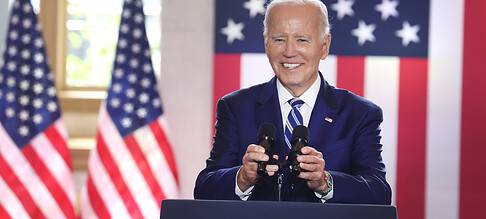
By Zach Friedman, Federal Policy Director at Ceres, and Alli Gold Roberts, State Policy Senior Director at Ceres
A year ago this week, the U.S. kickstarted the most consequential one-year period for climate action in the country's history when President Biden signed the bipartisan Infrastructure Investment and Jobs Act. With $1.2 trillion in investment for transportation, energy security, climate resilience, water systems, pollution cleanup, clean energy innovation, and more, the package received strong support from both parties in Congress to deliver on two long-term priorities for the U.S. economy: upgrading our nation's aging infrastructure and accelerating the shift to a cleaner economy.
This summer, Congress followed up by passing the Inflation Reduction Act. That monumental legislation represents the largest climate package in U.S. history, a mammoth investment in industrial and economic development policy, and a potential turning point in the fight against the climate crisis. Ceres supported the infrastructure bill as an important first step ahead of the Inflation Reduction Act, and we are pleased that its benefits - many of which will be key to meeting our climate goals - are already rolling out across the country.
Federal agencies like the Department of Transportation and Department of Energy will continue to play a central role in its implementation, but much of the law's work also falls to the states, demonstrating the power of the relationship between federal and state governments. This dynamic is at the core of the infrastructure package, providing states with billions of dollars in additional transportation and energy infrastructure money through both formula funds and grants.
The U.S. business community has called for years for much-needed modernizations and upgrades to ensure our nation's roads, rails, ports, airports, energy infrastructure, and supply chains are built to compete. The work doesn't end now that Congress has provided the funds, and states will determine how to deploy much of this new money. Companies, investors, and other stakeholders must remain engaged with both federal and state policymakers to maximize the package's climate benefits - including by prioritizing public transit as a congestion and climate solution, and by building projects that are energy efficient and resilient against the threat of climate change.
That's why, in May, Ceres organized dozens of companies, trade organizations, institutions, and other energy consumers to call on the nation's governors to use the federal infrastructure funds to bolster state energy efficiency efforts.
This federal-state partnership is also highlighted in the package's billions of dollars for electric vehicle charging infrastructure, another area that Ceres prioritized earlier this year by making a series of recommendations for the charging program to federal highway officials. At this stage, every state in the country has submitted and received federal approval for a charging plan. As a result, we will soon see a national charging network built out over 75,000 miles of highway.
States will play a central role in implementing several of the package's other climate-smart and sustainable investments, such as improving Amtrak service, capturing carbon dioxide from infrastructure corridors, implementing smart manufacturing technologies, cleaning up our nation's water systems, and upgrading and securing the electric grid. In support of the latter goal, Ceres recently sent letters urging state policymakers across the country to pursue the law's State Energy Plan grant awards, which provide funding and technical assistance for state-led clean energy initiatives.
As part of our robust policy strategy, Ceres has long worked at both the state and federal levels of government to champion the smart climate solutions that companies and investors demand. Now, a year after its crucial investments became law, Ceres and the companies and investors in our networks remain closely engaged with the bipartisan infrastructure deal and its implementation. Its biggest impacts will be felt in the years to come, and we urge companies, investors, and policymakers at both levels of government to continue this highly productive collaboration to ensure its benefits are felt in every state and community in the U.S.
View additional multimedia and more ESG storytelling from Ceres on 3blmedia.com.
Contact Info:
Spokesperson: Ceres
Website: https://www.ceres.org/about-us?utm_source=3BL&utm_medium=organic&utm_campaign=&utm_term=aboutus
Email: [email protected]
SOURCE: Ceres
Read More















